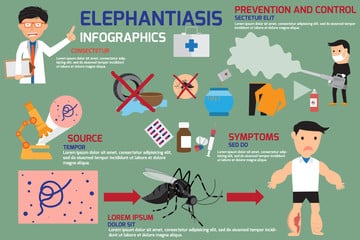I can say Filariasis is a disease caused by the worm which simply affect man, and which is transmitted by a mosquito. In a few Of the various cases that contracted filariasis, there is a condition that later developed which is so-called elephantiasis. I know a few people would have heard about this, maybe one way or the other and don’t seem to know the danger this might cause. In a few Of the various cases that contracted Filariasis, left it untreated. This may be a life-threatening as this could be caused so much disaster to the person having this disease, this includes; psychological, socially e.t.c.
The infection is spread by various different varieties of mosquitoes like Anopheles mosquito; Aedes mosquitoes; Culex mosquito e.t.c.
How does mosquito transmit this disease from man to man?
The mosquito becomes infected by biting a man who is suffering from Filariasis disease and has the microfilaria present in the blood. In the mosquito the worm develops and grow to is full length. So when the mosquito bites an individual it deposits the worms (usually a pair at a time) on the surface of the skin and enters into the bloodstream.
Having entered the bloodstream the pair of Filariasis makes is way and go straight to a gland called lymph gland, usually in the area of the groin. In some months later up to five to eighteen months, the worms mature and produce microfilaria disease.
There is a serious matter as this person that is infected can infect everyone in that area/community, after this Filariasis disease has been stuck in the body it can not be developed further until when it is carried again by the infected person by the mosquito. It develops in the mosquito again and transmits it to another person bitten by a mosquito. In this way, the vicious circle continues.
According to research, it is known that the adult worms that have given birth to the microfilaria live and continue to reproduce for a period of ten years. During this period of time and years, they cause irritation in the lymph gland of the person caring Filariasis disease, and as a result, the scar tissue is formed which later contract and block the flow of lymph through it.
After the blocking of the lymph, the leg becomes swollen and the characteristics enlarged limb forms, known as elephantiasis. Fortunately, only a few infected persons are afflicted with this complication.
What is the treatment of Filariasis?
In recent time there is various methods and treatment for Filariasis, some are sold commercially and some are available on over the counter drugs, However, all these drugs are more effective against the adult worm. It is also given an intravenous solution in a dosage of 1mg per kilogram of body weight. Hetrazan is given orally in doses of and is given 3 times daily or qds, up to 4 weeks. Also, the swelling limb of the patient may be reduced by applying a bandage.
Prevention of Filariasis
The patient should be removed from the area where the infection is endemic, otherwise, he may become infected.






